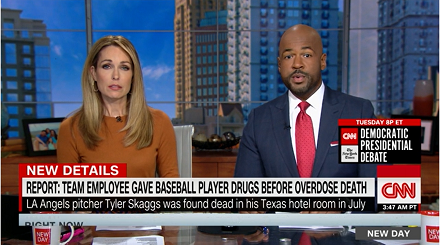

The question, of course, is what we can expect in 2020. Will other pro leagues follow suit? And what does it mean for amateur sports?
For MLB, which released its decision in December, the change was largely driven by the need to give players a means of coping with pain caused by sports injuries, without turning to opioids. In fact, MLB has noted it will begin testing players for opioids and remove marijuana from its list of "drugs of abuse," as part of its updated drug program, the league and the players union said in its news release.
Going forward, players will be tested for opioids, fentanyl, cocaine and synthetic THC, along with the other substances listed under "drugs of abuse," which includes banned substances and drugs classified as Schedule I or Schedule II under federal law.
The issue of players using opioids became a critical issue when news broke of the death of 27-year-old Los Angeles Angels' pitcher Tyler Skaggs in July. An autopsy released in August found Skaggs died from choking on vomit after using drugs and alcohol. High levels of opioids were found in his system, including fentanyl, oxycodone and oxymorphone. The death was an accident, the autopsy found.
MLB Commissioner Rob Manfred said Skaggs' death was a "motivating factor" to address a "societal problem" within the context of the MLB.
Cannabis has increasingly come under study in sports. In 2017, the World Anti-Doping Agency (WADA) took cannabidiol (CBD, viewed as the non-mind-affecting substance) off its list of prohibited substances. According to the website, MadeByHemp, WADA’s threshold for THC (which is a pysychoactive drug) is 150 nanograms (ng) per milliliter (ml), which was raised from 15ng/ml in 2013. This is the highest THC threshold compared to the collegiate and professional sports leagues in the U.S.
In terms of recreational substances, WADA has been progressive. Dr. Alan Vernec, the agency’s medical director, told the LA Times, “It’s a very active process that … is always open to debate and is discussed regularly.”
There has been an uptick in the number of national governing bodies forming alliances with cannabidiol (CBD) brands, including, most recently, USA Triathlon. MLB stands alone as the national governing body that allows a mind-altering substance.
Already, however, there are rumblings that show it will not stay alone – at least not for long. Despite the NHL’s emphatic statement that Canada’s legalization of cannabis would not change the league’s longstanding drug policy, it appears to be back-pedaling. In October, SDM reported that the NHL Alumni Association, NEEKA Health Canada and Canadian cannabis company Canopy Growth Corp. have created a clinical research partnership to investigate the effectiveness of cannabinoids in retired players who suffer from depression, post-traumatic stress disorders and progressive dementia as a result of past concussions. And with traumatic brain injury – and its toll on athletes – taking center stage, the findings of this study may provide the leverage needed to loosen restrictions in hockey.
According to MadeByHemp, cannabis is not currently on the NHL’s list of banned substances as it is not considered performance-enhancing. However, the league does not condone the use of marijuana and for the present, players are still tested for cannabinoids under the NHL/NHL Players Association (NHLPA) Substance Abuse and Behavioral Health Program.
There was no immediate word as to when results would be released; however, it is widely believed the NHL will be the next pro league to embrace cannabis.
Even the late David Stern, who tightened the league’s stance on marijuana during his time as commissioner from 1984-2014, raised eyebrows when, in a recently aired UNINTERRUPTED documentary, he stated that medical marijuana “probably should be removed from the banned substance list.”
The pro leagues’ intentions – if not their actions – are filtering down. The NCAA, in 2014, passed legislation that reduced the penalty for a positive marijuana test from a full season to half a season. This, notes MadeByHemp, is less of a penalty than a positive test for performance-enhancing drugs such as steroids or human growth hormone (HGH).
The financial impact of the marijuana industry is an absolute, and is being regarded as an economic development boon. Investopedia notes that New Frontier's report predicting the impact of federally legal marijuana suggests that nationwide legalization could generate 1.1 million jobs by 2025, since workers would be needed to farm, process, distribute and sell marijuana-based products. Secondary industries also would be expected to grow which, while related to legal cannabis, were not directly involved in its production and distribution. These might include software developers, financing services, construction companies and others.
Additionally, as sponsorship funds from local businesses become harder to get, the cannabis industry, either in CBD or THC form, has been a growing (heh) opportunity. And with more cannabis industry companies wishing to establish acceptance, funding may be readily available for years to come.
As an increasing number of states deregulate cannabis, either for medicinal or recreational use (and as more are expected to do so in 2020), it will become incumbent upon event owners to set policies for themselves. Often, these are viewed through the lens of the national governing body; however, there may be cases, such as with youth organizations, sobriety-based sports groups or religious conferences, where other concerns come into play.
And here’s a final thought. In 2028, the Summer Olympics come to California, where weed is fully legalized. It is widely believed that baseball and softball will be among the showcase sports present. If MLB players are among those on the diamond, it will be up to the World Baseball Softball Confederation, as well as the IOC, to decide how to handle the usage of cannabis among American players. While they have the better part of a decade to figure it out, it’s likely that by that time, the landscape of sports, as shaped by marijuana, will have changed drastically.
SDM will continue to follow this developing issue, and to report on its impact upon the sports business industry.
